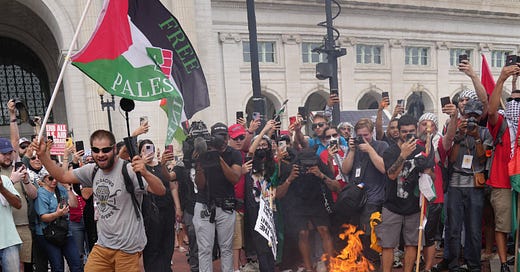Over the past couple years, I’ve watched from here in Canada with increasing concern the slow descent of the American right-wing influencer sphere into conspiratorial antisemitism. This train of thought has always been present on “the right”, and we saw a rise in it back in 2016 when Trump first ran for office and the alt-right (the real one led by Richard Spencer) grow in popularity. But since October 7th, it seems to have come back in full force, and once again it’s being thrust into the public spotlight in the past two weeks with the Trump Administration bringing the antisemitic child sex trafficker Andrew Tate back to America, and Joe Rogan bringing on Ian Carrol to declare Jews as responsible for Jeffrey Epstein’s behavior. Next week, Rogan is also expected to bring on Darryl Cooper who is an open Nazi sympathizer.
However, what's interesting from a Canadian perspective is that despite the immense cultural overlap between right-wing Canadians and right-wing Americans, such a rise in antisemitism has been virtually absent on this side of the border, with anti-Israel and anti-Jewish agitation being essentially entirely confined to the left. Off the top of my head, I can think of three anti-Jewish right-wing influencers on Canadian Twitter, and only one of them has any real credibility as an activist beyond online influencing. Compare this to the United States, where Candace Owens runs the second largest conservative podcast in America, in which she spends time talking about conspiracies revolving around 18th century Messianic shtetlbillie cults.
The conventional explanation for this is that Canada is just ten years behind America’s cultural trends, and Canada will eventually get the same antisemitism too. There are also policy considerations involved; obviously citizens of a country who give to Israel billions in foreign aid every year will develop more interest, both positively and negatively, than Canadians will. However, I think that conservatives in Canada have maintained a stronger messaging strategy against the Palestine protesters through a strategy which would be significantly harder to implement if Canada had a larger Jewish population.
It goes without saying that the chief target of the watermelon mobs that we’ve seen for the past year and a half (aside from potentially the Democratic Party establishment) are Jewish people, but this fact must be juggled with two other facts:
Most Americans are not Jewish, don’t know many Jewish people, and don’t really understand antisemitism; and
Jews are not the only targets of these mobs.
Jewish organizations, of course, do not cater to non-Jews, but they’re theoretically subject to the desires of the Jewish community and, even more than that, they’re at the whims of their donors who are overwhelmingly baby boomers. When Palestine supporters launch a protest where they dress up as terrorists and harass random people, these Jewish organizations will quickly come out to condemn the demonstrations as acts of antisemitism, pointing to the lies they told about Israel, and pointing out how phrases like “from the river to the sea” are, in fact, calls for genocide.
That might all be true, but the problem with this is that none of this rhetoric resonates with normal people who, at best, won’t really register what you’re talking about and, at worst, will see this as more woke whining. Americans have other things to worry about than whether a slogan regarding a conflict halfway across the world is a call to genocide, nor are they worried about falling victim to antisemitism. As a result, these disruptive protesters are seen as just another ethnic feud in America’s streets that don’t really concern anyone else.
However in Canada, the Jewish community is much smaller and less influential. Consequently Jewish organizations do not have the same national megaphone that their American counterparts do. For context, Canada’s Jewish community is proportionally ~40% of the size of America’s Jewish population (0.9% vs 2.4%), whilst obviously being vastly smaller numerically. As a result, it has largely been non-Jewish Canadian conservatives, not Jews, leading the way in crafting the response to these protesters, and the difference couldn’t be more stark.
Go to a typical Canadian conservative’s social media page and find a post about anti-Israel protesters, and you’ll scarcely hear a word about antisemitism. Instead, they talk about things that actually matter to normal people: some freak playing terrorist dress-up just threatened to kill one of our heroic policemen; families trying to take their kids skating on New Years’ are having some hysterical woman blow a megaphone in their ear; mothers feel unsafe bringing her daughter to the mall to buy her a prom dress because Hamas supporters are screaming at her in Arabic.
It’s difficult for any right-winger to disagree with this messaging. One can talk about complicated conspiracies that their audience doesn’t have the time or interest to research until the cows come home, but it’s much harder to defend harassing women at the mall because of foreign aid money or whatever. Is Candace Owens an antisemite? Frankly, your average American doesn’t know nor care. But does Candace Owens think that mobs of terrorist lovers should be shutting down Thanksgiving parades? Will she condemn that? This type of stuff matters much more to ordinary people. The scope of our messaging and rhetoric should speak to that.
If Jewish organizations want to win normal people to our side, this is the message we have to promote. You’re either on the side of normal people who want business as usual, or you’re on the side of deranged terrorist simps screaming at you dressed up in Hamas cosplay, woke college students taking over public land that you pay for, and communist agitators harassing you in the streets. Those are the teams. The winning message isn’t appealing to the sensibilities of boomer donors, who likely have no clue where their money is actually going, rather we will succeed by reaching normal people at their everyday level.
- Beau Chasse






